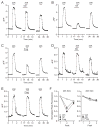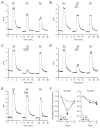Progesterone inhibition of voltage-gated calcium channels is a potential neuroprotective mechanism against excitotoxicity
- PMID: 21371490
- PMCID: PMC3129396
- DOI: 10.1016/j.steroids.2011.02.013
Progesterone inhibition of voltage-gated calcium channels is a potential neuroprotective mechanism against excitotoxicity
Abstract
The therapeutic use of progesterone following traumatic brain injury has recently entered phase III clinical trials as a means of neuroprotection. Although it has been hypothesized that progesterone protects against calcium overload following excitotoxic shock, the exact mechanisms underlying the beneficial effects of progesterone have yet to be determined. We found that therapeutic concentrations of progesterone to be neuroprotective against depolarization-induced excitotoxicity in cultured striatal neurons. Through use of calcium imaging, electrophysiology and the measurement of changes in activity-dependent gene expression, progesterone was found to block calcium entry through voltage-gated calcium channels, leading to alterations in the signaling of the activity-dependent transcription factors NFAT and CREB. The effects of progesterone were highly specific to this steroid hormone, although they did not appear to be receptor mediated. In addition, progesterone did not inhibit AMPA or NMDA receptor signaling. This analysis regarding the effect of progesterone on calcium signaling provides both a putative mechanism by which progesterone acts as a neuroprotectant, as well as affords a greater appreciation for its potential far-reaching effects on cellular function.
Copyright © 2011 Elsevier Inc. All rights reserved.
Figures







References
-
- Wright DW, Kellermann AL, Hertzberg VS, Clark PL, Frankel M, Goldstein FC, et al. ProTECT: a randomized clinical trial of progesterone for acute traumatic brain injury. Ann Emerg Med. 2007;49:391–402. e1–2. - PubMed
-
- Goss CW, Hoffman SW, Stein DG. Behavioral effects and anatomic correlates after brain injury: a progesterone dose-response study. Pharmacol Biochem Behav. 2003;76:231–42. - PubMed
-
- Robertson CL, Puskar A, Hoffman GE, Murphy AZ, Saraswati M, Fiskum G. Physiologic progesterone reduces mitochondrial dysfunction and hippocampal cell loss after traumatic brain injury in female rats. Exp Neurol. 2006;197:235–43. - PubMed
Publication types
MeSH terms
Substances
Grants and funding
LinkOut - more resources
Full Text Sources

